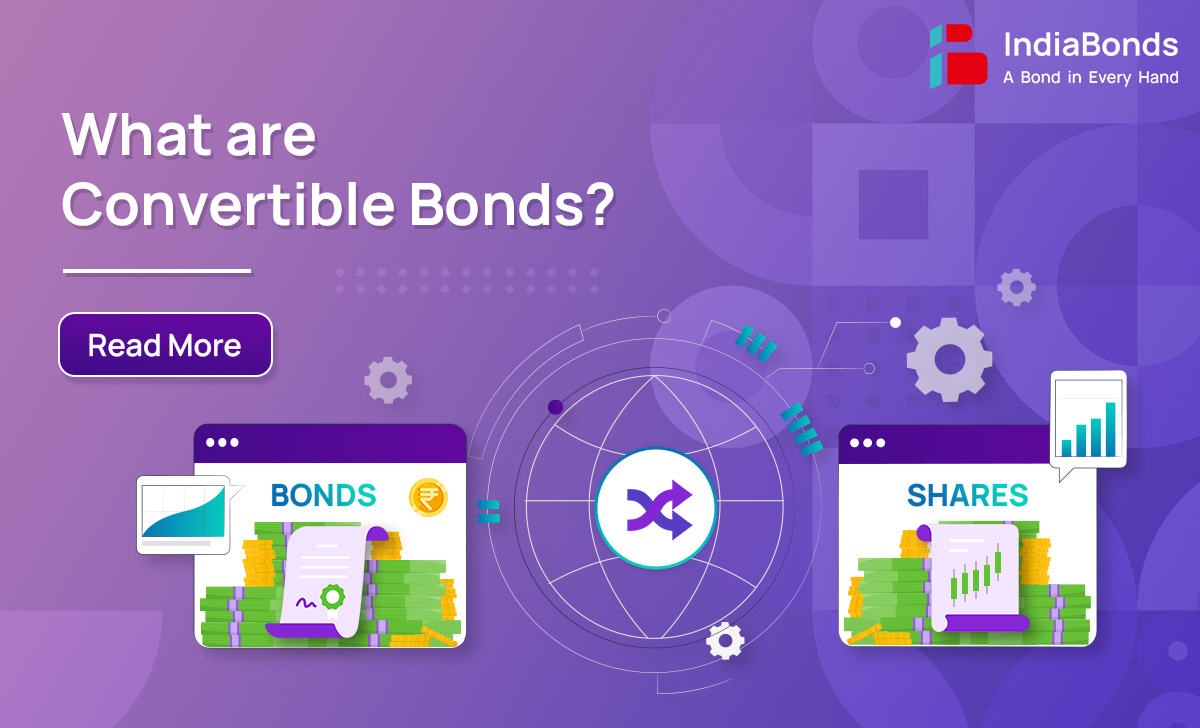What is a convertible bond? Difference between convertible and non-convertible bond

Introduction
Investors are diligently looking for the necessary and sufficient information regarding their investment goals and the financial instruments they have chosen. Bond investments have been the talk of the town in recent years, and sufficient information is being made available through numerous means. However, some early investors are still unclear about the notions of bonds or debentures, specifically “what is the difference between convertible and non-convertible debentures?”
This blog post will clarify the key distinctions between the two.
What is a Convertible Bond?
An investor who purchases a convertible bond has the option to convert the bond into a predetermined number of shares at a specific point during the bond’s tenure. It is a hybrid security that combines aspects of equity and debt.
A convertible bond has a maturity date and pays interest to investors, just like standard bonds do. The face value of the bond will also be paid to the holder at maturity if they choose not to convert their bonds to equity.
A convertible bond behaves like any other fixed-income investment. In most bonds, the face value is typically Rs.1lac. The interest rate on the bond, known as the coupon rate, is paid by the issuing company. For instance, a convertible bond with a Rs.1 lac face value and a 6% coupon will pay out Rs 6,000 annually or Rs.3,000 semi-annually.
Businesses frequently issue convertible bonds with lower credit ratings and excellent development potential. The bonds provide greater financial flexibility than standard bonds. They also carry a lower interest rate cost to issuer than standard bonds given the convertibility option.




Types of Convertible Bonds
An increasingly common option for start-up investments is convertible bonds. The following list of convertible bond kind is based on their features:
“Vanilla” Convertible Bonds:
Bonds that can be converted into cash are known as “vanilla” convertible bonds. These bonds are converted into shares if the share price rises, but they remain bonds if the share price falls.
Mandatory convertibles:
When these bonds mature, investors are compulsorily required to convert them into shares. There are two different conversion prices for this convertible bond. One sets a maximum share price at which the investor will get equity in exchange for their investment. The second restricts the investor’s ability to receive more money than their original investment.
Reverse convertibles:
The issuer benefits from these bonds. When the bonds reach maturity, the holders are given the choice to either buy them back from the investor in cash or convert them into equity at a predetermined conversion price and rate.
Convertible to preferred stock:
Although the principal is not guaranteed, these convertible bonds convert to preferred stock and provide high dividend rates.
Exchangeable Bonds:
They have the unusual ability to be converted into stock in a different company. To boost demand for the bonds, they can also be traded for an underlying blue-chip stock.
CoCo:
Contingent convertible bonds, also referred to as “CoCos,” are common in the financial environment in Europe. They function similarly to convertible bonds but have higher interest rates and are made to guard against capital losses for the issuer.
Foreign currency convertible Bonds:
Bonds that can be converted into foreign currencies are known as foreign currency convertible bonds. They are useful when a business raises financing in a currency that is stronger abroad than at home.
Advantages of Convertible Bonds
1. Holders of convertible bonds only receive a fixed, restricted income.
This is a huge benefit for the business as a larger portion of the operating income is now accessible to the owners of common stock. If a business succeeds, it must exclusively distribute its operational revenue to the newly converted shareholders.
2. Common investors have the power to cast the majority of votes.
Bondholders are not permitted to vote for directors. Therefore, offering convertible bonds will be more advantageous than using common stock for fundraising if the management level of a firm is worried about losing voting control of the business and needs an alternative source of financing.
3. The issuing corporation can deduct the cost of bond interest.
For instance, if the business is subject to a 30% tax rate, the government will be required to cover 30% of the interest payments on the convertible debt. Therefore, convertible bonds are preferable to preferred shares when a company plans to issue new capital.
4. They support a company in delaying the acquisition of equity capital.
This delays the common stock and the dilution of earnings per share since it takes time for bondholders to exchange their bonds for stock.
5. Businesses can provide bonds with reduced coupon rates.
Convertible bonds can be sold at a lower coupon rate than conventional bonds since there is an option to buy equities.
Disadvantages of Convertible Bonds
1. The business has the right to convert them against their will.
The issuing corporation has the power to demand forcible conversion when the stock price is more than what would be due if the bond were redeemed. A bond’s call date is another instance. This indicates that the bond’s capital growth is limited.
2. These securities are complicated.
Because of their qualities, convertible bonds can confuse novice investors as to whether they are stocks or bonds. You must also take a few other elements into account that may have an impact on the cost of these bonds. These may include the interest rate environment and the market for the underlying stocks.
3. They carry more danger.
Holders of convertible bonds have a lower priority claim on the business’s assets if the issuing company declares bankruptcy. It is necessary to pay off the secured loan holders first.
4. They are exchanged for a price over the going market rate.
To make the conversion effective, investors must permit the stock to reach the conversion price.
5. They might be harmful to the issuing company.
The EPS of the corporation’s common stocks may be reduced as a result of these investments, and the company also runs the danger of losing control.
Convertible vs Non-convertible Debentures
The following table shows the key differences between convertible vs non-convertible debenture.
| Parameter | Convertible Debenture | Non-Convertible Debenture (NCD) |
| Definition | After a predetermined time, the firm may convert them whole or partially into equity shares. | They cannot be changed into the company’s equity shares. |
| Rate of Interest | They cannot be changed into the company’s equity shares. Since they can be converted into equity shares, they have a lower interest rate than NCDs. | Compared to convertible debentures, they carry a higher interest rate. |
| Maturity Value | The current stock price of the corporation determines the maturity value of these debentures. Higher returns are provided by higher stock prices, whereas lower returns are provided by lower stock prices. | The investors will get returns that are constant when held to maturity. |
| Status | The holders of convertibles have the opportunity to convert into equity shares in a down market and lock-in cheaper value | NCD holders are the company’s creditors and cannot change their economics post issuance. |
| Risk | Since you can convert them into equity shares, they are more risky than NCDs as equity tends to be more volatile. | Non-convertible debentures are less risky than convertible debentures because they are standard fixed income product paying stable coupons and redemption at maturity. |
Conclusion
Debentures are financial obligations issued by companies who need to raise capital. These debentures can also be divided into groups according to how easily they can be converted, redeemed and transferred. We covered the two categories of debentures: convertible and non-convertible. They are very few convertibles in India that are eligible for participation in India. However, the issuance of NCDs is huge and you can see live offers on IndiaBonds here.
FAQs:
1. Can convertible bonds be converted any time?
The conversion from bond to equity is done at a specific point during the bond’s tenure. This is predetermined at the time of issuance.
2. Where can I buy convertible bonds?
You can sign-up on IndiaBonds.com or connect with our Bond Managers to guide you through our platform.
3. What are the advantages of Convertible Bonds?
Investors get fixed rate of interest on their investments till maturity and also can have the advantage of stock value appreciation when converted to equity.
Disclaimer: Investments in debt securities/ municipal debt securities/ securitised debt instruments are subject to risks including delay and/ or default in payment. Read all the offer related documents carefully.













































